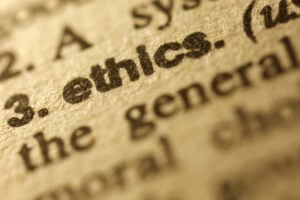The Ethics Of Legal Software: Beyond Compliance
The ethical path respects the unique value of human judgment, empathy, and experience in the legal process.
 In the rapidly evolving world of legal software, the conversation often centers around compliance, particularly concerning regulations against the unauthorized practice of law (UPL). However, a broader, perhaps more profound, discussion is to be had — one that explores the ethics of legal software development. It’s about going beyond the black-and-white letter of the law to grapple with the shades of gray in ethical responsibilities.
In the rapidly evolving world of legal software, the conversation often centers around compliance, particularly concerning regulations against the unauthorized practice of law (UPL). However, a broader, perhaps more profound, discussion is to be had — one that explores the ethics of legal software development. It’s about going beyond the black-and-white letter of the law to grapple with the shades of gray in ethical responsibilities.
Ethics in legal software development isn’t just about adhering to UPL regulations. It’s about considering the impact of technology on the legal system, its practitioners, and, most importantly, the people it serves. This responsibility extends beyond ensuring that a piece of software doesn’t illegally dispense legal advice.
It’s about asking, “Are we doing the right thing?”

The Business Case For AI At Your Law Firm

Let’s start with transparency. In an industry where the output can significantly impact legal outcomes, transparency isn’t just nice to have; it’s an ethical imperative.
Legal software developers need to be clear about how their tools work, the limitations of their algorithms, and the data they use. This transparency is crucial in building trust and ensuring that users — lawyers or clients — understand the tool they rely on.
Then there’s the issue of bias. Like all technology, legal software is not immune to the biases of those who create it. An ethical approach to development means actively working to identify and mitigate these biases. This is more than a compliance issue; it’s a commitment to fairness and justice, principles that lie at the heart of the legal profession.
Another ethical consideration is accessibility. Legal technology has the potential to democratize access to legal services, making them more affordable and available. Ethical development in this context means creating software that does not inadvertently deepen the divide between those who can afford high-end legal services and those who cannot. It’s about leveling the playing field, not tilting it further in favor of the privileged.
Sponsored

Navigating Financial Success by Avoiding Common Pitfalls and Maximizing Firm Performance

Generative AI In Legal Work — What’s Fact And What’s Fiction?


Is The Future Of Law Distributed? Lessons From The Tech Adoption Curve

Is The Future Of Law Distributed? Lessons From The Tech Adoption Curve
Moreover, the ethical development of legal software must also consider its impact on the practice of law itself. Are we creating tools that enhance the lawyer’s role, or are we edging toward replacing human judgment with algorithmic decision-making? The ethical path respects the unique value of human judgment, empathy, and experience in the legal process.
The ethics of legal software development go well beyond mere compliance with UPL regulations. It’s about a commitment to transparency, fairness, accessibility, and the preservation of the human element in law. As we continue to innovate in this space, let’s ensure that our compass is legal compliance and a deeper sense of ethical responsibility.
 Olga V. Mack is a Fellow at CodeX, The Stanford Center for Legal Informatics, and a Generative AI Editor at law.MIT. Olga embraces legal innovation and had dedicated her career to improving and shaping the future of law. She is convinced that the legal profession will emerge even stronger, more resilient, and more inclusive than before by embracing technology. Olga is also an award-winning general counsel, operations professional, startup advisor, public speaker, adjunct professor, and entrepreneur. She authored Get on Board: Earning Your Ticket to a Corporate Board Seat, Fundamentals of Smart Contract Security, and Blockchain Value: Transforming Business Models, Society, and Communities. She is working on three books: Visual IQ for Lawyers (ABA 2024), The Rise of Product Lawyers: An Analytical Framework to Systematically Advise Your Clients Throughout the Product Lifecycle (Globe Law and Business 2024), and Legal Operations in the Age of AI and Data (Globe Law and Business 2024). You can follow Olga on LinkedIn and Twitter @olgavmack.
Olga V. Mack is a Fellow at CodeX, The Stanford Center for Legal Informatics, and a Generative AI Editor at law.MIT. Olga embraces legal innovation and had dedicated her career to improving and shaping the future of law. She is convinced that the legal profession will emerge even stronger, more resilient, and more inclusive than before by embracing technology. Olga is also an award-winning general counsel, operations professional, startup advisor, public speaker, adjunct professor, and entrepreneur. She authored Get on Board: Earning Your Ticket to a Corporate Board Seat, Fundamentals of Smart Contract Security, and Blockchain Value: Transforming Business Models, Society, and Communities. She is working on three books: Visual IQ for Lawyers (ABA 2024), The Rise of Product Lawyers: An Analytical Framework to Systematically Advise Your Clients Throughout the Product Lifecycle (Globe Law and Business 2024), and Legal Operations in the Age of AI and Data (Globe Law and Business 2024). You can follow Olga on LinkedIn and Twitter @olgavmack.
Sponsored

Legal AI: 3 Steps Law Firms Should Take Now

The Business Case For AI At Your Law Firm









